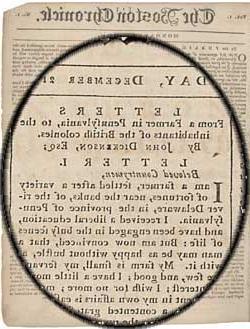"Letters From a Farmer in Pennsylvania, to the inhabitants of the British colonies ..."
To order an image, navigate to the full
display and click "request this image"
on the blue toolbar.
-
Choose an alternate description of this item written for these projects:
- Main description
[ This description is from the project: Coming of the American Revolution ]
"the cause of one is the cause of all"
This is the first of twelve letters from John Dickinson, a keen legal scholar and self-described “Farmer in Pennsylvania”. It has been republished in a Boston paper at the end of 1767. Dickinson had been a delegate to the Stamp Act Congress that convened in New York City in 1765. Now New York is again in the news for violating the Quartering Act of 1765, which required all colonies to provide housing and supplies for British troops. 1,500 of those soldiers had landed in New York City in 1766 and because they were not given quarters (places to stay), they had to remain aboard their ships. To punish New York, Britain has suspended its legislature.
To view all eight pages of this newspaper, please see the online display of the The Boston Chronicle, 21 December 1767.
This is the first of twelve letters from John Dickinson, a keen legal scholar and self-described “Farmer in Pennsylvania”. It has been republished in a Boston paper at the end of 1767. Dickinson had been a delegate to the Stamp Act Congress that convened in New York City in 1765. Now New York is again in the news for violating the Quartering Act of 1765, which required all colonies to provide housing and supplies for British troops. 1,500 of those soldiers had landed in New York City in 1766 and because they were not given quarters (places to stay), they had to remain aboard their ships. To punish New York, Britain has suspended its legislature.
To view all eight pages of this newspaper, please see the online display of the The Boston Chronicle, 21 December 1767.
Questions to Consider
1. What is the significance of the letter's salutation?
2. How does the writer introduce himself? How does he portray himself and why? What aspects of his background does he select and what does he leave out? What would be the reason for those choices?
3. What does liberty mean to him?
4. What has prompted him to speak out in the form of these letters?
5. What injustice has been overlooked by most of the colonists, in Dickinson's view?
6. Why was the colony of New York being punished? What was the crime? What was the punishment? Why does Dickinson say that the New Yorkers "have been punished in a manner pernicious to American freedom, and justly alarming to all the colonies"?
7. Dickinson argues that "the cause of one is the cause of all." What does he mean by that and how does he back up his argument?
8. What worries Dickinson about the responses of the other colonies?
9. He ends his letter with a Latin quote. What is his reason for doing this?
Further Exploration
10. Would you characterize John Dickinson as a radical, a moderate or a conservative? Support your claim.
11. Outline Dickinson's argument about the possible domino effects of the Parliamentary action taken in regards to the New York assembly. What sequence of cause and effect does he lay out? What are the strengths and weaknesses of his argument and why?
12. Why did Dickinson use a letter format as a means of communication? Cite examples of other documents on this website which use this vehicle and explain why the writers might have chosen to do so.
13. Sam Adams wrote, "I always looked upon a standing Army especially in time of peace not only [as] a Disturbance but in every respect dangerous to civil Community." Research historical examples that support his claim. Then as a counterpoint, see if you can find documentation that might lead to other conclusions.
1. What is the significance of the letter's salutation?
2. How does the writer introduce himself? How does he portray himself and why? What aspects of his background does he select and what does he leave out? What would be the reason for those choices?
3. What does liberty mean to him?
4. What has prompted him to speak out in the form of these letters?
5. What injustice has been overlooked by most of the colonists, in Dickinson's view?
6. Why was the colony of New York being punished? What was the crime? What was the punishment? Why does Dickinson say that the New Yorkers "have been punished in a manner pernicious to American freedom, and justly alarming to all the colonies"?
7. Dickinson argues that "the cause of one is the cause of all." What does he mean by that and how does he back up his argument?
8. What worries Dickinson about the responses of the other colonies?
9. He ends his letter with a Latin quote. What is his reason for doing this?
Further Exploration
10. Would you characterize John Dickinson as a radical, a moderate or a conservative? Support your claim.
11. Outline Dickinson's argument about the possible domino effects of the Parliamentary action taken in regards to the New York assembly. What sequence of cause and effect does he lay out? What are the strengths and weaknesses of his argument and why?
12. Why did Dickinson use a letter format as a means of communication? Cite examples of other documents on this website which use this vehicle and explain why the writers might have chosen to do so.
13. Sam Adams wrote, "I always looked upon a standing Army especially in time of peace not only [as] a Disturbance but in every respect dangerous to civil Community." Research historical examples that support his claim. Then as a counterpoint, see if you can find documentation that might lead to other conclusions.

